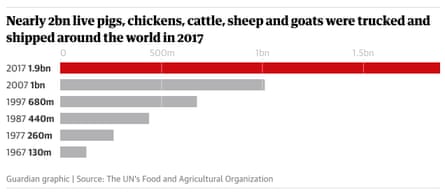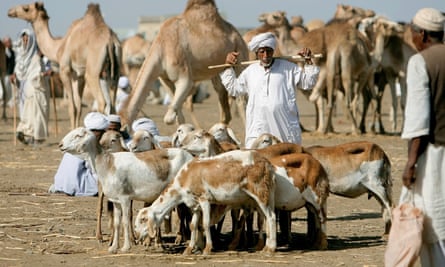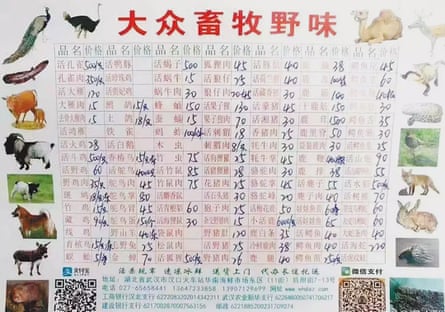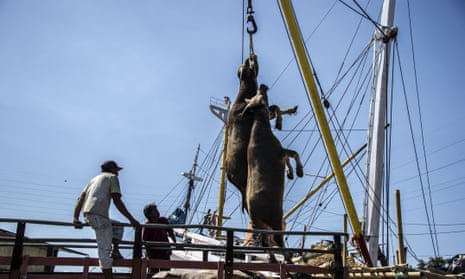Live animal exports
We’ve been investigating and reporting on the growing trade in live animal exports, which despite welfare and disease concerns, has quadrupled in size over the past 50 years. Nearly 2 billion animals a year are transported around the world on journeys which, in some cases, can take more than 40 days.
The Middle East is a focal point of the trade, with live animal exports to the region rising steadily over the past two decades, particularly from Europe. The trade is driven by rising demand for meat and dairy and water shortages in the region, which limits domestic production. Saudi Arabia imported 7 million cattle and sheep in 2017. In just one year, Turkey went from importing $600m (£457m) worth of animals in 2016 to $1.2bn in 2017.

The risk of disease transmission from live animals has been in the headlines recently with the coronavirus outbreak linked to a wet market in Wuhan, eastern China. There continues to be a demand for freshly slaughtered or “warm meat” over chilled meat in Hong Kong and China. In interviews with the Guardian, veterinarians said the rise in live animal exports was a growing problem for the spread of a number of diseases, some of which could also threaten humans.
Doubts have been raised as to whether countries are properly reporting suspected disease outbreaks. Saudi Arabia temporarily blocked sheep imports from Sudan after an outbreak of Rift Valley fever. Live animal exports are a vital source of income for Sudan, worth approximately $500 million in 2018.

During our week-long focus on the live export trade we’ve also been reporting on:
Europe’s booming trade: Economics are trumping animal welfare standards in the EU as a decline in the numbers of slaughterhouses has seen the trade treble in value from $1bn in 2000 to $3bn in 2018.
Animal welfare failings: Injured animals left to die and sheep melting in the heat on old and inferior ships. Secret decks found on a ship that capsized last year killing more than 14,000 sheep travelling from Romania to Saudi Arabia – the discovery of which has led to questions on whether overloading was to blame for the capsize.
Europe’s biggest exporter of live animals: the story of Romania and the £18 sheep
The UK’s chicken loophole: UK’s proposed ban on live exports may not stop export of tens of millions of chicks every year.
News from around the world
One of the world’s biggest meat companies, JBS, has signed a deal to supply beef, poultry and pork to China in a deal that could generate up to $700 million a year. JBS, a Brazilian company - linked to deforestation in the Amazon – slaughters 13 million animals every single day and has annual revenue of $50 billion.
China is set to report record pork imports in 2020 as it continues to suffer from an outbreak of African swine fever (ASF). ASF has spread to Vietnam, Laos, Myanmar, Cambodia, the Philippines, South Korea and Indonesia. The outbreak is expected to increase pork production in Brazil and the US. The average Chinese person gets through about 30kg of pork a year (by comparison, people in US eat about 26kg of beef a year and UK consumers about 18kg).

The temporary ban on wildlife markets in China should be made permanent, says an expert. Coronavirus is believed to have emerged from Huanan seafood market in the industrial city of Wuhan, where wild animals such as snakes, porcupines and pangolins are sold. “We have had similar diseases caused by illegal wildlife trafficking and if we don’t ban the trade these diseases will happen again,” said Jinfeng Zhou, secretary general of the China Biodiversity Conservation and Green Development Foundation.
The European Commission has suspended imports of poultry meat from Ukraine after an outbreak of the highly contagious H5N8 bird flu. Outbreaks have been reported in the Czech Republic, Poland, Slovakia, Hungary and Romania. Separately, more than 18,000 chickens have been culled following an outbreak of H5N1 avian influenza in Hunan, China.
The European Parliament is being asked this week to debate a meat tax that could generate €32bn (£27bn) in revenue a year. The campaign group behind the proposal says the revenues generated should be split between helping farmers invest in more sustainable agricultural practices, reducing VAT, subsidising fruit and vegetables, supporting low-income households, and funding greenhouse gas reductions and climate change adaptation in developing countries.
More than one-fifth of fish sold in markets in Buenos Aires province is not the fish it is labelled as, according to DNA testing by Argentinian researchers. The authors of the study say mislabelling is not just an issue of food fraud and public health, but also a conservation problem, due to the overfishing of threatened species.
British company Cranswick has opened a £75m chicken slaughter facility capable of processing 15,000 birds per hour in Suffolk. It will be supplied with birds from Cranswick-owned and run farms across Norfolk and Suffolk and is expected to produce 1 million chickens a week.
Quote of the month
A decline of small slaughterhouses in the UK (and Europe) has been blamed on high waste disposal costs, requirements for CCTV in the UK and a fall in the value of hides and skins. John Mettrick, who runs a small abattoir in Derbyshire, said:
We were getting £45 for cattle hides and £6.50 for sheep skins 20 years ago. We now get £1 for a hide if it is in perfect condition and nothing for skins. So instead of getting £15,750 for cattle hides we only get £350.
Share your stories
Thank you to everyone who contacted us with their thoughts and stories on the live animal export trade. We want to hear from you about your experiences and stories from inside the farming industry. Please get in touch. You can contact us at: animalsfarmed@theguardian.com.
